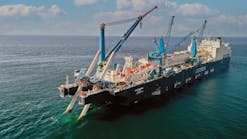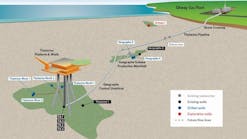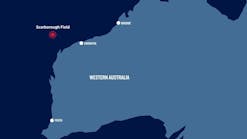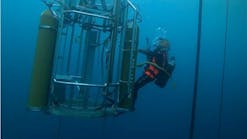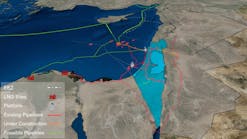Malcolm Kelland, chief scientist at RF, illustrates how little of the water-soluble polymer developed in cooperation with Exxon (bottle in left hand) is required to match the effect of conventional "antifreeze" (right hand) in combating hydrate formation.
Commercialization of an environmentally friendly product developed jointly by Rogaland Research (RF) and Exxon Production Research (EPR) that prevents formation of gas hydrates in multiphase pipelines has begun. The product has been successfully applied on a field in the Gulf of Mexico and is extending to other fields in the Gulf and around the world. The product is being marketed by Nalco-Exxon Energy Chemicals under the tradename FreeFlow.
Gas hydrates form in untreated multiphase flows under particular combinations of pressure and temperature, and can lead to the complete blocking of pipelines. Hydrates have long been a concern to the offshore oil industry, and as exploration and production activities move into deeper, colder, more remote waters, they are even more of a concern. However, it is not only in cold conditions that hydrates form - given the right pressure conditions, they can form in temperatures as high as 25°C.
FreeFlow is a polymer first developed and tested in a three-year research project at RF. It acts as a so-called kinetic inhibitor, delaying the onset of hydrate formation long enough to avoid problems during transportation, says chief scientist Malcolm Kelland, who led the inhibitor design work for RF. The product presents a number of advantages - reduced capital and operating costs - when compared with traditional "anti-freeze" fluids such as methanol and glycol. For a start, the required dosage level is much smaller - 20-60 times less. Thus the size of storage facilities and injection lines can be reduced, with concomitant cost savings.
The product is also water soluble and has no detrimental effects on the marine environment. When the pipeline flow reaches its destination, it can be separated out from the wellstream products and safely disposed of in the sea. This presents significant savings, compared with the plant used to regenerate methanol and glycol.
FreeFlow is based on the same type of chemical which was used for blood plasma replacement during the Second World War. Variants of this chemical are also used today in hair gel.
RF has been working with a consortium of oil companies and TR Oil Services on other ways of tackling the hydrate problem. One of these is the development of anti-agglomerants, which allow hydrates to form, but prevent them from agglomerating into plugs or depositing in flowlines, Kelland says. The hydrate is carried along in the form of fine particles as a slurry in the hydrocarbon phase.
Anti-agglomerants appear to be effective at more extreme conditions than kinetic inhibitors, which makes these products of interest to operators looking for cost-effective hydrate control in remote or deepwater fields, Kelland says.
